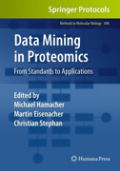
Data mining in proteomics: from standards to applications
Hamacher, Michael
Eisenacher, Martin
Stephan, Christian
Through the rapid development of proteomics methods and technologies, an enormous amount of data was created, leading to a wide-spread rethinking of strategy design and data interpretation. In Data Mining in Proteomics: From Standards to Applications, experts in the field present these new insights within the proteomics community, taking the historical evolution as well as the most important international standardization projects into account. Along with basic and sophisticated overviews of proteomics technologies, standard data formats, and databases, the volume features chapters on data interpretation strategies including statistics, spectra interpretation, and analysis environments as wellas specialized tasks such as data annotation, peak picking, phosphoproteomics, spectrum libraries, LC/MS imaging, and splice isoforms. As a part of the highly successful Methods in Molecular Biology™ series, this work provides the kind of detailed description and implementation advice that is crucial for getting optimal results. Authoritative and cutting-edge, Data Mining in Proteomics:From Standards to Applications is a well-balanced compendium for beginners and experts, offering a broad scope of data mining topics but always focusing onthe current state-of-the-art and beyond. Features an international look at the cutting-edge of proteomics study Contains practical, concrete examples of the most invaluable current technologies along with detailed applications of those technologies Presents chapters with implementation advice straight from theexperience of expert researchers INDICE: Instruments and Methods in Proteomics.- In-Depth Protein Characterization by Mass Spectrometry.- Analysis of Phosphoproteomics Data.- The Originand Early Reception of Sequence Databases.- Laboratory Data and Sample Management for Proteomics.- PRIDE and ‘Database on Demand’ as Valuable Tools for Computational Proteomics.- Analyzing Proteomics Identifications in the Context ofFunctional and Structural Protein Annotation: Integrating Annotation Using PICR, DAS, and BioMart.- Tranche Distributed Repository and ProteomeCommons.org.- Data Standardization by the HUPO-PSI: How Has the Community Benefitted?.- mzIdentML: An Open Community-Built Standard Format for the Results of ProteomicsSpectrum Identification Algorithms.- Spectra, Chromatograms, Metadata: mzML –The Standard Data Format for Mass Spectrometer Output.- imzML: Imaging Mass Spectrometry Markup Language – A Common Data Format for Mass Spectrometry Imaging.- Tandem Mass Spectrometry Spectral Libraries and Library Searching.- Inter-Lab Proteomics: Data Mining in Collaborative Projects on the Basis of the HUPO Brain Proteome Project´s Pilot Studies.- Data Management and Data Integration in the HUPO Plasma Proteome Project.- Statistics in Experimental Design, Preprocessing, and Analysis of Proteomics Data.- The Evolution of Protein Interaction Networks.- Cytoscape: Software for Visualization and Analysis of Biological Networks.- Text Mining for Systems Modelling.- Identification of Alternatively Spliced Transcripts Using a Proteomic Informatics Approach.- Distributionsof Ion Series in ETD and CID Spectra: Making a Comparison.- Evaluation of Peak Picking Algorithms for Protein Mass Spectrometry.- OpenMS and TOPP: Open Source Software for LC-MS Data Analysis.- LC/MS Data Processing for Label-Free Quantitative Analysis.- Spectral Properties of Correlation Matrices: Towards Enhanced Spectral Clustering.- Standards, Databases, and Modeling Tools in Systems Biology.- Modelling of Cellular Processes: Methods, Data, and Requirements.
- ISBN: 978-1-60761-986-4
- Editorial: Humana
- Encuadernacion: Cartoné
- Páginas: 420
- Fecha Publicación: 29/11/2010
- Nº Volúmenes: 1
- Idioma: Inglés
